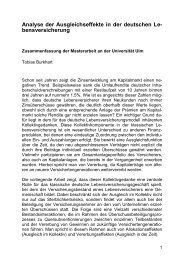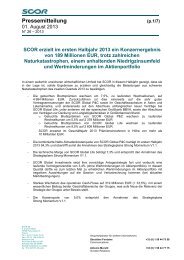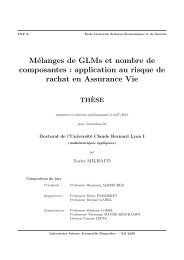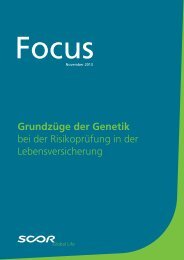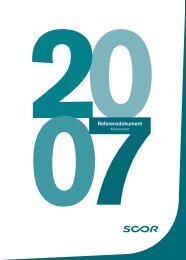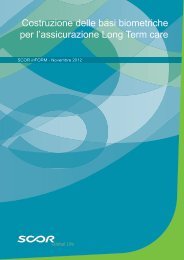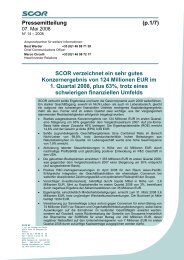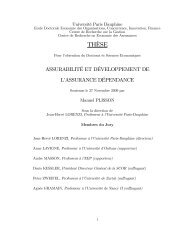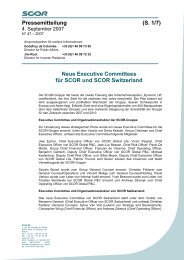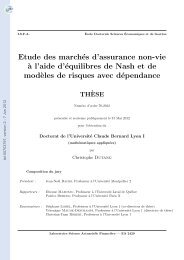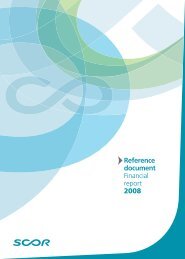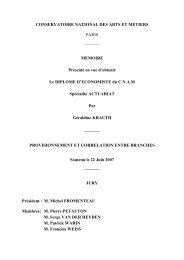4.4 Legal risk - Scor
4.4 Legal risk - Scor
4.4 Legal risk - Scor
You also want an ePaper? Increase the reach of your titles
YUMPU automatically turns print PDFs into web optimized ePapers that Google loves.
For SCOR Global Life:<br />
- an internal annual actuarial analysis, including a review of all segments and a full analysis of the<br />
segments that may have a substantial impact on SCOR’s balance sheet. This analysis is recorded in<br />
the Group Actuarial annual report;<br />
- an external annual review of SCOR Global P&C division reserves adequacy, in addition to several<br />
external reviews already required by local regulators (Canada, Australia and Hong Kong).<br />
• Business is underwritten throughout the year, the share of renewable business being comparatively low. The<br />
life business plan is updated on a quarterly basis with the business actually underwritten. These plans are<br />
approved by the COMEX;<br />
• A quarterly review of technical results is performed by region (i.e. France, Germany, UK/Ireland, Rest of<br />
Europe, North America, Asia/Pacific, Middle East, Others) and by line of business;<br />
• Underwriting and pricing guidelines, defined by SCOR Global Life, specify the underwriting capacities<br />
delegated to each entity, as well as the underwriting rules and principles to be complied with. Updates and<br />
revisions follow formalised approval processes;<br />
• Business opportunities going beyond the stipulations of the guidelines thus defined are subject to special<br />
referral procedures at two key levels: (1) by the Central Actuarial & Underwriting Department and where<br />
applicable the Risk Management Department, the Finance Department of SCOR Global Life, and the Group<br />
<strong>Legal</strong> Department, (2) for cases which may have a significant impact on the balance sheet (thresholds and/or<br />
conditions defined in a procedure or specific guidelines) by the Group Risk Management Department;<br />
• Claims exceeding a predefined threshold are reviewed by the Central Actuarial & Underwriting Department of<br />
SCOR Global Life;<br />
• Cross reviews are commissioned by SCOR Global Life's CEO to evaluate the quality of underwriting, pricing,<br />
medical underwriting and claims handling of particular business units, to identify and assess <strong>risk</strong>s, to evaluate<br />
the appropriateness and effectiveness of controls and to propose <strong>risk</strong>-management measures, including<br />
mitigating actions;<br />
• For SCOR Global Life, scenarios are established in conjunction with the Risk Management Department of<br />
SCOR Global Life in order to define the need for retrocession coverage; the retention and retrocession<br />
structure is revised every year and subject to SGL COMEX and Group Chief Risk Officer approval;<br />
• Risks specific to the administration of contracts are subject to controls performed at the level of the<br />
subsidiaries and branches. SCOR’s Group Information System includes multiple automatic controls and<br />
additional control tools;<br />
• The Group Chief Actuary gives his opinion on the reserves adequacy with regards to products or portfolios<br />
whose estimation is particularly difficult to assess. The scope under the review of the Group Actuarial<br />
Department, includes Guaranteed Minimum Death Benefit (GMDB) products, long term care in France, health,<br />
and finally mortality and critical illness in UK /Ireland and health business, and mortality in the U.S.. The Group<br />
Actuarial Department does not intend to provide a second best estimate to be compared with SCOR Global<br />
Life’s but verifies the adequacy of the assumptions leading to the life division's best estimates. In some cases,<br />
the Group Actuarial Department applies a global approach and calculates a confidence interval in order to<br />
check that the reserves booked are within the said confidence interval. Similar to the P&C side, an annual<br />
report is established by the Group Actuarial Department, where the Group Chief Actuary gives his opinion on<br />
the adequacy of the reviewed booked reserves. The main objective of this report is to provide the COMEX as<br />
well as the Audit Committee an opinion on the reviewed reserving adequacy of the Life division but also to<br />
highlight the inherent uncertainties surrounding this assessment.<br />
ii) Asset management<br />
• The Group has harmonized the principles governing asset management: the Statement of Group Investment<br />
Principles defines the Group’s governance in terms of asset management and the Manual of Group<br />
Investment Guidelines determines the conditions in which SCOR Global Investments will implement, on behalf<br />
of all Group subsidiaries, the investment policy as defined by the Group’s Investment Committee; both of<br />
these documents have been approved by the Group’s COMEX;<br />
• Investments going beyond the stipulations thus defined are subject to special referral procedures managed by<br />
the Group Risk Management Department;<br />
• In 2008, SCOR Global Investments SE was specially created to manage all of SCOR’s financial assets and<br />
obtained on 15 May 2009 approval from the French financial market regulatory body (AMF) as an asset<br />
management company. To this end, the management and control procedures have been revised and<br />
investment decisions are implemented by SCOR Global Investments in accordance with the directives of the<br />
Group Investment Committee and with the investment guidelines. The Group Investment Committee meets at<br />
least once every quarter. Its role is to coordinate tactical asset allocation on a Group level and to supervise the<br />
application of objectives by the asset management company, observing the constraints established;<br />
382



